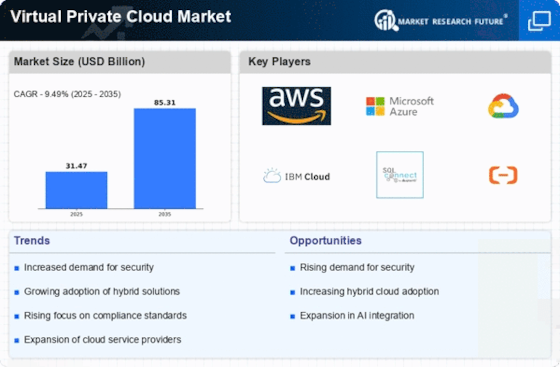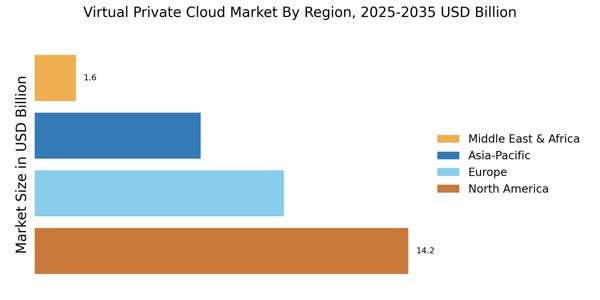Enhanced Data Privacy Regulations
The Virtual Private Cloud Market is significantly influenced by the implementation of enhanced data privacy regulations across various jurisdictions. Governments are increasingly enacting stringent laws to protect consumer data, which compels organizations to adopt more secure cloud solutions. For instance, regulations such as the General Data Protection Regulation (GDPR) in Europe have heightened awareness regarding data protection. As businesses strive to comply with these regulations, the demand for Virtual Private Clouds, which offer dedicated resources and improved security features, is expected to rise. This shift not only ensures compliance but also fosters consumer trust, which is paramount in today’s digital economy. The market is projected to expand as organizations prioritize data privacy and security, thereby driving growth within the Virtual Private Cloud Market.
Rising Demand for Scalable Solutions
The Virtual Private Cloud Market is experiencing a notable surge in demand for scalable solutions. Organizations are increasingly seeking flexible cloud environments that can adapt to their evolving needs. This trend is driven by the necessity for businesses to manage fluctuating workloads efficiently. According to recent data, the market for scalable cloud solutions is projected to grow at a compound annual growth rate of approximately 22% over the next five years. Companies are recognizing that Virtual Private Clouds offer the ability to scale resources up or down based on real-time requirements, thereby optimizing operational costs. This adaptability is particularly appealing to startups and enterprises alike, as it allows them to maintain agility in a competitive landscape. As a result, the Virtual Private Cloud Market is likely to witness sustained growth fueled by this demand for scalability.
Cost Efficiency and Resource Optimization
Cost efficiency remains a pivotal driver within the Virtual Private Cloud Market. Organizations are increasingly recognizing the financial advantages of adopting Virtual Private Clouds over traditional on-premises infrastructure. By leveraging cloud solutions, businesses can significantly reduce capital expenditures associated with hardware and maintenance. Recent analyses indicate that companies can save up to 30% on IT costs by migrating to Virtual Private Clouds. This cost-effectiveness is particularly appealing to small and medium-sized enterprises, which often operate with limited budgets. Furthermore, the ability to optimize resource allocation and only pay for what is used enhances overall financial management. As a result, the Virtual Private Cloud Market is likely to see continued growth as more organizations seek to enhance their cost efficiency through cloud adoption.
Increased Adoption of Remote Work Solutions
The shift towards remote work has catalyzed growth in the Virtual Private Cloud Market. As organizations adapt to flexible work arrangements, the need for secure and reliable cloud solutions has become paramount. Virtual Private Clouds provide a secure environment for remote employees to access critical applications and data without compromising security. This trend is underscored by data indicating that nearly 70% of companies are investing in cloud technologies to support remote work initiatives. The ability to maintain productivity while ensuring data security is driving organizations to adopt Virtual Private Clouds as a preferred solution. Consequently, the Virtual Private Cloud Market is poised for expansion as businesses continue to embrace remote work as a long-term strategy.
Growing Interest in Disaster Recovery Solutions
The Virtual Private Cloud Market is witnessing a growing interest in disaster recovery solutions. Organizations are increasingly aware of the potential risks associated with data loss and system failures. Virtual Private Clouds offer robust disaster recovery capabilities, enabling businesses to safeguard their data and ensure business continuity. Recent statistics suggest that nearly 60% of small businesses that experience a data loss incident cease operations within six months. This alarming trend has prompted organizations to invest in reliable disaster recovery solutions, with Virtual Private Clouds emerging as a viable option. By providing automated backups and rapid recovery options, these cloud solutions are becoming essential for risk management strategies. As a result, the Virtual Private Cloud Market is likely to experience growth driven by the increasing emphasis on disaster recovery.

















